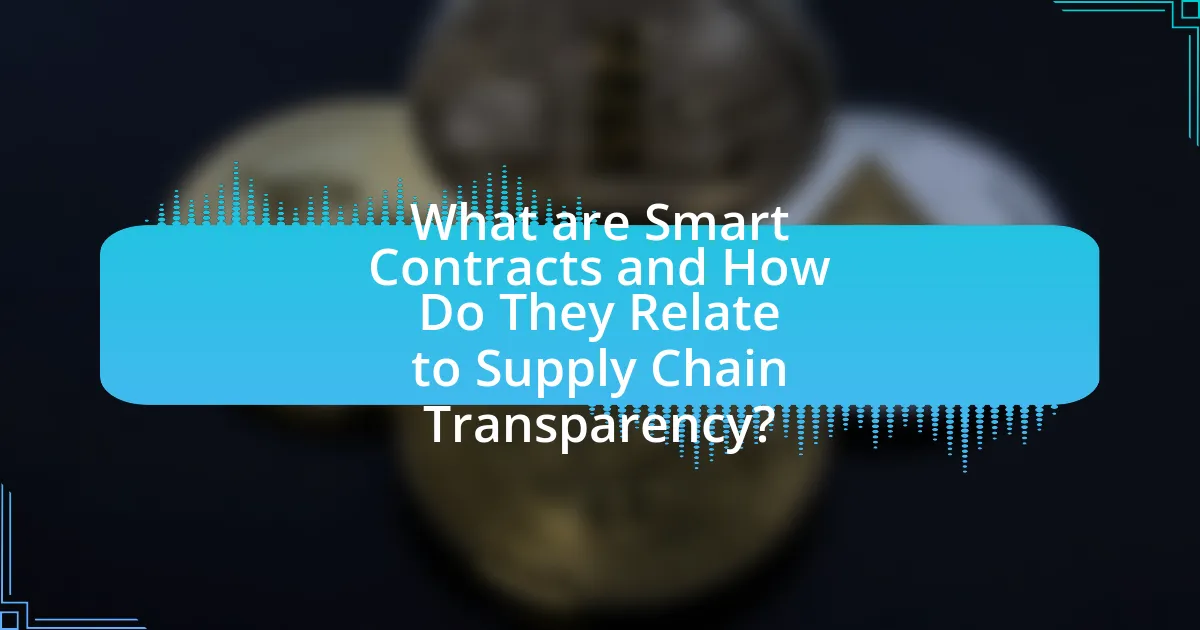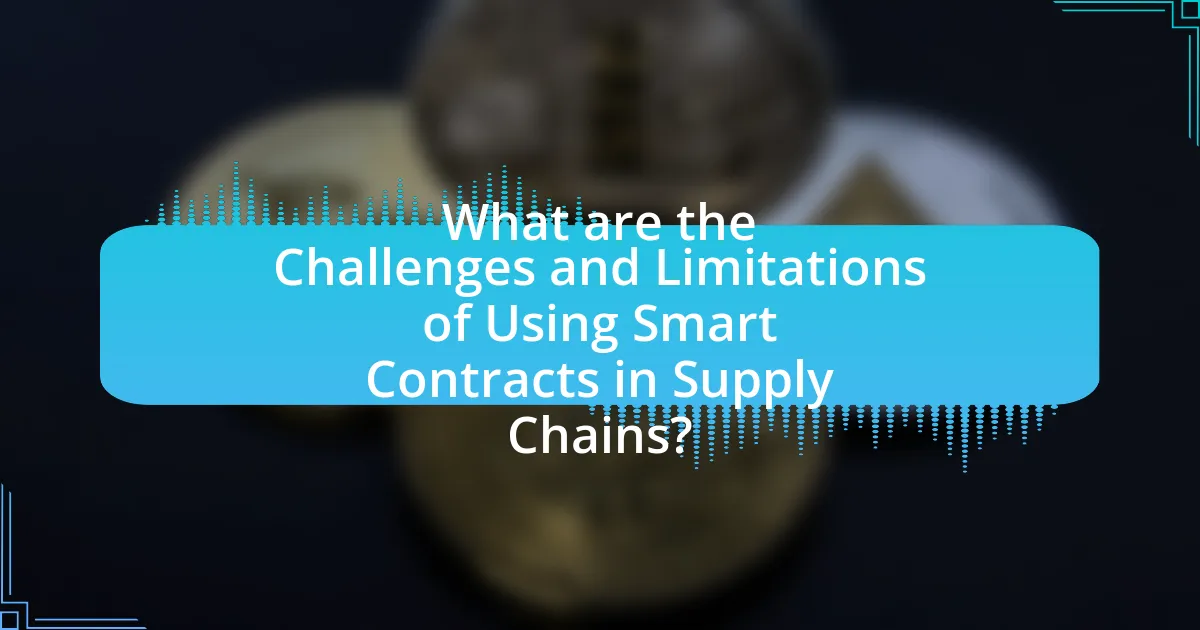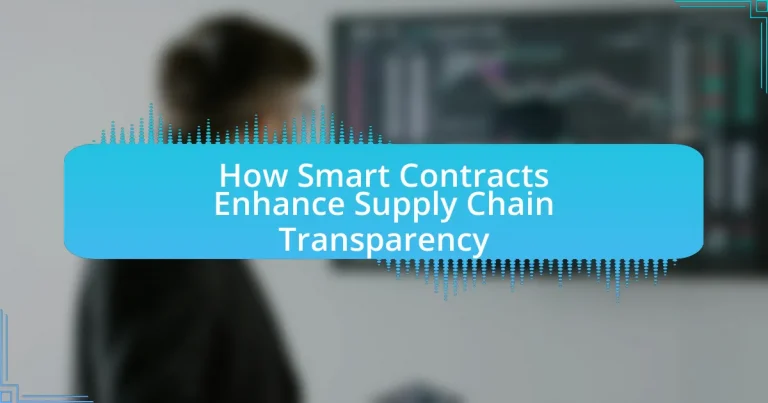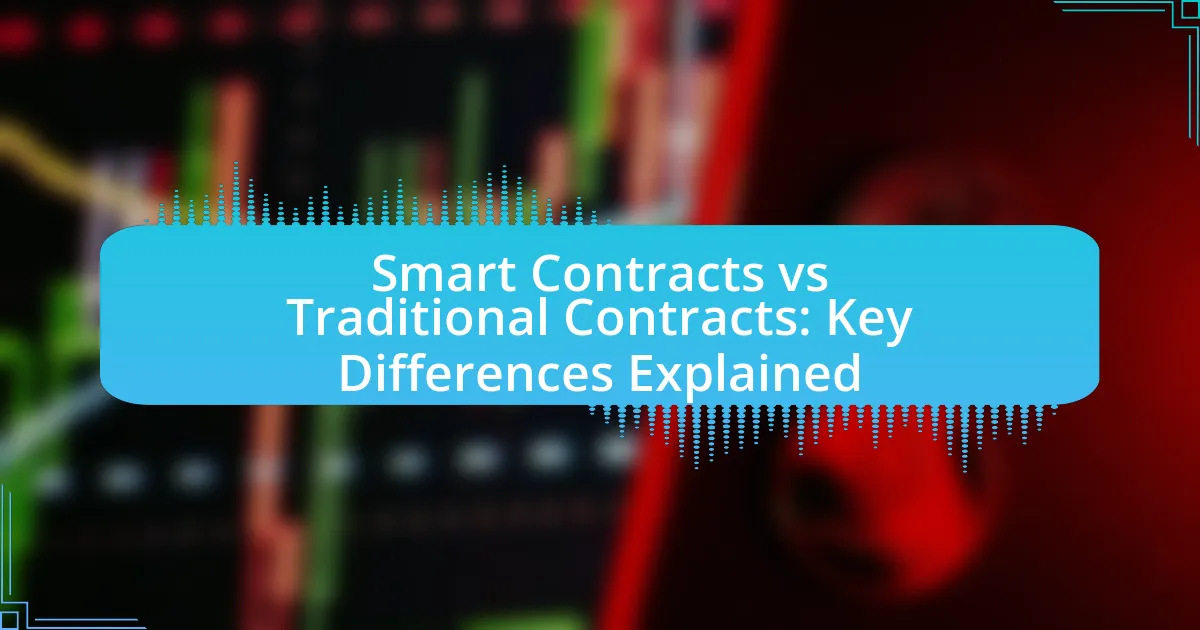Smart contracts are self-executing agreements coded on blockchain technology that significantly enhance supply chain transparency. By automating transactions and ensuring real-time access to information, smart contracts reduce fraud and errors while fostering trust among stakeholders. Key features such as immutability, automated execution, and decentralized verification contribute to a transparent supply chain, allowing for efficient tracking of goods and compliance verification. The article explores how smart contracts streamline processes, improve collaboration, and address challenges faced by traditional supply chains, ultimately leading to increased operational efficiency and consumer trust.

What are Smart Contracts and How Do They Relate to Supply Chain Transparency?
Smart contracts are self-executing contracts with the terms of the agreement directly written into code, operating on blockchain technology. They enhance supply chain transparency by automating and securing transactions, ensuring that all parties have access to the same information in real-time. This transparency reduces fraud and errors, as every transaction is recorded on an immutable ledger, allowing stakeholders to track the movement of goods and verify compliance with contractual obligations. For instance, a study by Accenture found that implementing blockchain and smart contracts in supply chains can reduce administrative costs by up to 30%, demonstrating their effectiveness in improving operational efficiency and trust among participants.
How do smart contracts function within supply chains?
Smart contracts function within supply chains by automating and enforcing agreements between parties without the need for intermediaries. These self-executing contracts utilize blockchain technology to ensure that all transactions are recorded transparently and immutably, which enhances trust among stakeholders. For example, when a shipment is delivered, a smart contract can automatically trigger payment to the supplier once predefined conditions, such as delivery confirmation, are met. This process reduces delays and errors associated with manual contract execution, as evidenced by a study from the World Economic Forum, which highlighted that smart contracts can decrease administrative costs by up to 30% in supply chain operations.
What are the key features of smart contracts that enhance transparency?
Smart contracts enhance transparency through features such as immutability, automated execution, and decentralized verification. Immutability ensures that once a smart contract is deployed on a blockchain, its code cannot be altered, providing a permanent and verifiable record of all transactions. Automated execution eliminates the need for intermediaries, reducing the potential for manipulation and errors, as the contract executes predefined conditions automatically. Decentralized verification allows all parties involved to access the same information in real-time, fostering trust and accountability among stakeholders. These features collectively contribute to a transparent supply chain by ensuring that all actions are recorded, visible, and tamper-proof.
How do smart contracts automate processes in supply chains?
Smart contracts automate processes in supply chains by executing predefined agreements automatically when specific conditions are met. This automation reduces the need for intermediaries, minimizes human error, and accelerates transaction times. For instance, when a shipment reaches a designated location, a smart contract can automatically trigger payment to the supplier, ensuring timely transactions and enhancing efficiency. According to a study by Accenture, implementing smart contracts can reduce administrative costs in supply chains by up to 30%, demonstrating their effectiveness in streamlining operations.
Why is transparency important in supply chains?
Transparency is important in supply chains because it fosters trust among stakeholders, enhances accountability, and improves operational efficiency. When supply chain processes are transparent, all parties can access real-time information regarding product sourcing, production, and distribution, which reduces the risk of fraud and errors. For instance, a study by the World Economic Forum found that companies with transparent supply chains can reduce costs by up to 20% and improve customer satisfaction by providing clear information about product origins and quality. This level of visibility allows for better decision-making and risk management, ultimately leading to a more resilient supply chain.
What challenges do traditional supply chains face regarding transparency?
Traditional supply chains face significant challenges regarding transparency due to a lack of real-time data sharing, fragmented systems, and limited visibility into the supply chain processes. The absence of integrated technology often results in information silos, where stakeholders do not have access to the same data, leading to discrepancies and mistrust. According to a 2020 report by the World Economic Forum, 79% of executives believe that a lack of transparency in supply chains can lead to inefficiencies and increased risks. Additionally, traditional supply chains often rely on manual processes, which are prone to errors and delays, further complicating transparency efforts.
How does transparency impact consumer trust and business reputation?
Transparency significantly enhances consumer trust and positively influences business reputation. When businesses openly share information about their practices, processes, and product sourcing, consumers feel more secure in their purchasing decisions. A study by Label Insight found that 94% of consumers are more likely to be loyal to a brand that offers complete transparency. This trust translates into a stronger reputation, as companies perceived as honest and open are more likely to attract and retain customers. Furthermore, transparency can lead to increased customer satisfaction and advocacy, as consumers appreciate brands that align with their values and provide clear, accessible information about their operations.

How Do Smart Contracts Improve Supply Chain Transparency?
Smart contracts improve supply chain transparency by automating and securing transactions on a blockchain, which allows all parties to access real-time data regarding the status and movement of goods. This technology ensures that every transaction is recorded in an immutable ledger, reducing the risk of fraud and errors. For instance, a study by Accenture found that blockchain technology can reduce supply chain costs by up to 30% by enhancing visibility and traceability. By providing a single source of truth, smart contracts facilitate trust among stakeholders, enabling them to verify compliance and authenticity without intermediaries.
What specific benefits do smart contracts provide for supply chain transparency?
Smart contracts enhance supply chain transparency by automating and securing transactions, ensuring that all parties have access to the same information in real-time. This technology eliminates intermediaries, reducing the risk of fraud and errors, while providing an immutable record of all transactions. For instance, a study by Accenture found that blockchain technology, which underpins smart contracts, can reduce supply chain costs by up to 30% through improved efficiency and transparency. Additionally, smart contracts facilitate traceability, allowing stakeholders to track the origin and journey of products, which is crucial for compliance and quality assurance.
How do smart contracts reduce fraud and errors in supply chains?
Smart contracts reduce fraud and errors in supply chains by automating and enforcing agreements through blockchain technology. This automation ensures that all parties adhere to the terms of the contract without the need for intermediaries, which minimizes the risk of manipulation or human error. For instance, smart contracts execute transactions automatically when predefined conditions are met, such as payment upon delivery confirmation, thereby eliminating discrepancies and disputes. Additionally, the immutable nature of blockchain records provides a transparent and verifiable audit trail, making it difficult for fraudulent activities to go unnoticed. According to a study by Accenture, implementing blockchain technology in supply chains can reduce fraud by up to 50%, demonstrating the effectiveness of smart contracts in enhancing supply chain integrity.
In what ways do smart contracts facilitate real-time tracking of goods?
Smart contracts facilitate real-time tracking of goods by automating data recording and verification processes within the supply chain. These self-executing contracts utilize blockchain technology to ensure that all transactions and movements of goods are recorded in an immutable ledger, providing transparency and traceability. For instance, when a shipment is dispatched, the smart contract automatically updates the status on the blockchain, allowing all stakeholders to access real-time information about the location and condition of the goods. This automation reduces the risk of human error and fraud, as each transaction is verified by the network, ensuring that the data is accurate and trustworthy.
How do smart contracts enhance collaboration among supply chain stakeholders?
Smart contracts enhance collaboration among supply chain stakeholders by automating and securing transactions through predefined rules. This automation reduces the need for intermediaries, thereby streamlining processes and minimizing delays. For instance, when a shipment is delivered, a smart contract can automatically trigger payment to the supplier, ensuring timely transactions and reducing disputes. Additionally, the transparency provided by blockchain technology allows all stakeholders to access real-time data, fostering trust and accountability. According to a study by Accenture, 80% of supply chain executives believe that blockchain will enhance collaboration by providing a single source of truth for all parties involved.
What role do smart contracts play in ensuring compliance and accountability?
Smart contracts play a crucial role in ensuring compliance and accountability by automating and enforcing contractual obligations in a transparent manner. They execute predefined conditions automatically, which reduces the risk of human error and manipulation, thereby enhancing trust among parties involved. For instance, in supply chain management, smart contracts can automatically verify that goods meet specified quality standards before payment is released, ensuring compliance with regulatory requirements. This automation not only streamlines processes but also provides an immutable record of transactions, which can be audited for accountability. The transparency inherent in blockchain technology, where these smart contracts operate, further reinforces compliance by allowing all stakeholders to access the same information in real-time, thus fostering a culture of accountability.
How can smart contracts streamline communication between parties?
Smart contracts can streamline communication between parties by automating and enforcing agreements through self-executing code on a blockchain. This automation reduces the need for intermediaries, minimizes misunderstandings, and ensures that all parties have access to the same information in real-time. For instance, in supply chain management, smart contracts can automatically trigger actions such as payments or notifications when predefined conditions are met, enhancing transparency and efficiency. According to a study by the World Economic Forum, the use of blockchain and smart contracts can reduce transaction costs by up to 40%, demonstrating their effectiveness in improving communication and operational efficiency among involved parties.

What are the Challenges and Limitations of Using Smart Contracts in Supply Chains?
The challenges and limitations of using smart contracts in supply chains include issues related to scalability, interoperability, legal recognition, and the complexity of contract execution. Scalability is a significant concern, as many blockchain networks struggle to handle a high volume of transactions efficiently, which can lead to delays in supply chain processes. Interoperability poses another challenge, as different blockchain platforms may not communicate effectively, hindering seamless integration across various systems used by supply chain participants. Legal recognition of smart contracts remains ambiguous in many jurisdictions, creating uncertainty regarding their enforceability. Additionally, the complexity of coding smart contracts can lead to errors or vulnerabilities, which may result in unintended consequences or exploitation. These challenges highlight the need for careful consideration and development of smart contract frameworks in supply chain applications.
What technical challenges do organizations face when implementing smart contracts?
Organizations face several technical challenges when implementing smart contracts, including scalability, interoperability, and security vulnerabilities. Scalability issues arise as blockchain networks may struggle to handle a high volume of transactions, leading to delays and increased costs. Interoperability challenges occur when different blockchain platforms cannot communicate effectively, hindering the seamless execution of smart contracts across various systems. Additionally, security vulnerabilities, such as coding errors or exploits, can lead to significant financial losses, as evidenced by incidents like the DAO hack in 2016, where a flaw in the smart contract code resulted in the loss of $50 million worth of Ether. These challenges necessitate careful planning and robust technical solutions to ensure successful implementation.
How do interoperability issues affect the use of smart contracts in supply chains?
Interoperability issues significantly hinder the effective use of smart contracts in supply chains by preventing seamless communication between different blockchain platforms and legacy systems. When supply chain participants utilize various technologies that do not communicate effectively, it leads to data silos, increased transaction costs, and delays in contract execution. For instance, a study by the World Economic Forum highlights that 70% of supply chain executives believe that lack of interoperability among systems is a major barrier to adopting blockchain solutions. This fragmentation can result in inefficiencies, as smart contracts rely on accurate and timely data from multiple sources to function optimally.
What are the legal and regulatory considerations for smart contracts?
Legal and regulatory considerations for smart contracts include compliance with existing contract law, jurisdictional issues, and regulatory frameworks governing digital transactions. Smart contracts must adhere to the principles of contract law, such as offer, acceptance, and consideration, to be enforceable. Jurisdictional issues arise because smart contracts can operate across borders, necessitating clarity on which laws apply. Additionally, regulatory frameworks, such as those from the Financial Action Task Force (FATF) and the European Union’s General Data Protection Regulation (GDPR), impact how smart contracts handle data and financial transactions. These considerations ensure that smart contracts function within legal boundaries and protect the rights of all parties involved.
How can organizations overcome these challenges?
Organizations can overcome challenges in enhancing supply chain transparency through the implementation of smart contracts. Smart contracts automate and enforce agreements between parties, reducing the potential for disputes and increasing trust. For instance, a study by the World Economic Forum highlights that using blockchain technology, which underpins smart contracts, can improve traceability and accountability in supply chains, leading to a 20% reduction in administrative costs. By leveraging these technologies, organizations can streamline processes, ensure compliance, and enhance visibility across the supply chain, ultimately addressing challenges related to transparency and efficiency.
What best practices should organizations follow when implementing smart contracts?
Organizations should follow several best practices when implementing smart contracts to ensure effectiveness and security. First, they must conduct thorough testing of the smart contracts in a controlled environment to identify and rectify any vulnerabilities before deployment. This is crucial as a report by the Ethereum Foundation highlights that over 70% of smart contracts contain bugs that could be exploited.
Second, organizations should ensure that the smart contracts are written in clear, understandable code, utilizing established programming languages like Solidity. This practice minimizes misunderstandings and errors during execution.
Third, organizations must implement robust security measures, including regular audits by third-party experts, to safeguard against potential attacks. According to a study by ConsenSys, 34% of smart contracts have been compromised due to inadequate security protocols.
Lastly, organizations should establish clear governance frameworks to manage the lifecycle of smart contracts, including updates and dispute resolution processes. This approach aligns with best practices in project management and ensures that all stakeholders are aware of their roles and responsibilities.
How can companies ensure stakeholder buy-in for smart contract adoption?
Companies can ensure stakeholder buy-in for smart contract adoption by actively engaging stakeholders through education and transparent communication about the benefits and functionalities of smart contracts. This engagement can include workshops, demonstrations, and pilot programs that illustrate how smart contracts enhance supply chain transparency, reduce costs, and improve efficiency. Research indicates that organizations that involve stakeholders early in the adoption process experience higher levels of acceptance and support, as evidenced by a study from the World Economic Forum, which found that 70% of companies that conducted stakeholder education initiatives reported increased buy-in for new technologies.
What are the future trends of smart contracts in enhancing supply chain transparency?
Future trends of smart contracts in enhancing supply chain transparency include increased automation, real-time tracking, and integration with IoT devices. Automation through smart contracts will streamline processes by executing transactions automatically when predefined conditions are met, reducing human error and delays. Real-time tracking will be facilitated by blockchain technology, allowing stakeholders to access up-to-date information about product status and location, thereby improving accountability. Additionally, the integration of smart contracts with IoT devices will enable automatic data collection and verification, ensuring that all parties have access to accurate and tamper-proof information. These trends are supported by the growing adoption of blockchain solutions in supply chains, with a report from Deloitte indicating that 40% of organizations are considering blockchain for supply chain management by 2025.
How might advancements in technology influence smart contract development?
Advancements in technology significantly influence smart contract development by enhancing their efficiency, security, and interoperability. For instance, the integration of artificial intelligence can automate contract execution and improve decision-making processes, while blockchain technology ensures data integrity and transparency. Furthermore, advancements in cryptographic techniques bolster security, reducing the risk of fraud and unauthorized access. According to a report by the World Economic Forum, smart contracts could automate up to 30% of the global economy by 2030, highlighting their potential impact as technology continues to evolve.
What potential innovations could further improve supply chain transparency?
Blockchain technology can significantly enhance supply chain transparency by providing a decentralized and immutable ledger for tracking transactions. This innovation allows all parties involved in the supply chain to access real-time data regarding product provenance, movement, and status, thereby reducing fraud and errors. For instance, a study by Accenture found that 90% of executives believe blockchain will be critical for supply chain transparency, as it enables traceability and accountability across the entire supply chain. Additionally, the integration of Internet of Things (IoT) devices can further improve transparency by providing continuous monitoring of goods, ensuring that stakeholders receive timely updates on conditions such as temperature and humidity during transit.
What practical steps can organizations take to leverage smart contracts for better supply chain transparency?
Organizations can leverage smart contracts for better supply chain transparency by implementing automated tracking and verification processes. By utilizing blockchain technology, organizations can create immutable records of transactions that are accessible to all stakeholders, ensuring real-time visibility into the supply chain. For instance, companies like IBM and Maersk have successfully used smart contracts to streamline shipping processes, reducing delays and enhancing accountability. Additionally, integrating IoT devices with smart contracts allows for automatic updates on product conditions and locations, further increasing transparency. This approach not only minimizes fraud but also fosters trust among partners, as all parties can independently verify the data recorded on the blockchain.















